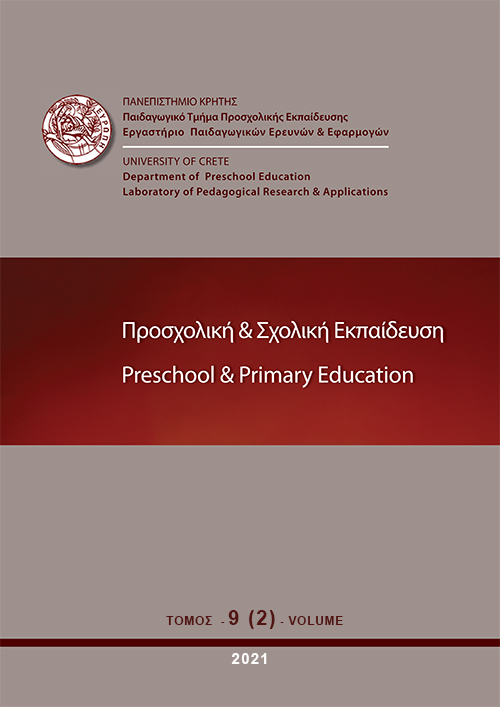Διερεύνηση της σχέσης μεταξύ της συναισθηματικής νοημοσύνης των διευθυντών με τη συλλογική αποτελεσματικότητα των εκπαιδευτικών και την επαγγελματική τους ικανοποίηση

Περίληψη
Σκοπός της εργασίας ήταν να διερευνηθεί η σχέση μεταξύ της συναισθηματικής νοημοσύνης των διευθυντών όπως αυτή γίνεται αντιληπτή από τους εκπαιδευτικούς με τη συλλογική αίσθηση αποτελεσματικότητας και την επαγγελματική τους ικανοποίηση. Στην έρευνα συμμετείχαν 205 εκπαιδευτικοί δευτεροβάθμιας εκπαίδευσης δημοσίων σχολείων. Οι συμμετέχοντες συμπλήρωσαν το Ερωτηματολόγιο Συναισθηματικής Ικανότητας (Boyatzis et al., 2000), την Κλίμακα Συλλογικής Αποτελεσματικότητας (Tschannen-Moran & Barr, 2004) και το Ερωτηματολόγιο Καταγραφής της Επαγγελματικής Ικανοποίησης Εκπαιδευτικών (Γκόλια, 2014). Η ανάλυση διακύμανσης έδειξε ότι οι εκπαιδευτικοί δήλωσαν σχετικά υψηλές τιμές σε όλες τις διαστάσεις των εργαλείων μέτρησης. Από την εφαρμογή της ανάλυσης κανονικής συσχέτισης (canonical correlation analysis) φάνηκε ότι η συναισθηματική νοημοσύνη των διευθυντών συνδέεται θετικά και στατιστικά σημαντικά τόσο με τη συλλογική αποτελεσματικότητα των εκπαιδευτικών (rc=.633) όσο και με την ικανοποίηση που βιώνουν οι εκπαιδευτικοί από την εργασίας τους (rc=.754), ερμηνεύοντας το 23.3% και 22.1% της μεταβλητότητας των αντίστοιχα. Η διάσταση της συλλογικής αποτελεσματικότητας Πειθαρχία Μαθητών συνδέονταν πιο ισχυρά με τη συναισθηματική νοημοσύνη των διευθυντών απ’ ότι η διάσταση Στρατηγικές Διδασκαλίας. Επιπλέον, η συναισθηματική νοημοσύνη των διευθυντών φαίνεται να συνδέεται με όλες τις διαστάσεις της επαγγελματικής ικανοποίησης, με την πιο δυνατή σχέση να αφορά την ικανοποίηση από τον διευθυντή και την πιο χαμηλή την ικανοποίηση από τους μαθητές.
Λεπτομέρειες άρθρου
- Πώς να δημιουργήσετε Αναφορές
-
Τσιγγίλης Ν., Καραμανέ Ε., & Κατσά Μ. (2021). Διερεύνηση της σχέσης μεταξύ της συναισθηματικής νοημοσύνης των διευθυντών με τη συλλογική αποτελεσματικότητα των εκπαιδευτικών και την επαγγελματική τους ικανοποίηση. Preschool and Primary Education, 9(2). https://doi.org/10.12681/ppej.26155
- Τεύχος
- Τόμ. 9, Αρ. 2 (2021)
- Ενότητα
- Άρθρα

Αυτή η εργασία είναι αδειοδοτημένη υπό το CC Αναφορά Δημιουργού – Μη Εμπορική Χρήση – Παρόμοια Διανομή 4.0.
Οι συγγραφείς των άρθρων που δημοσιεύονται στο ΠΡΟΣΧΟΛΙΚΗ & ΣΧΟΛΙΚΗ ΕΚΠΑΙΔΕΥΣΗ διατηρούν τα δικαιώματα πνευματικής ιδιοκτησίας επί των άρθρων τους, δίνοντας στο περιοδικό το δικαίωμα της πρώτης δημοσίευσης. Άρθρα που δημοσιεύονται στο ΠΡΟΣΧΟΛΙΚΗ & ΣΧΟΛΙΚΗ ΕΚΠΑΙΔΕΥΣΗ διατίθενται με άδεια Creative Commons 3.0 και σύμφωνα με την άδεια μπορούν να χρησιμοποιούνται ελεύθερα, με αναφορά στο/στη συγγραφέα και στην πρώτη δημοσίευση για μη κερδοσκοπικούς σκοπούς και με δικαίωμα τροποποίησης μόνον με παρόμοια διανομή (αν αναμείξετε, τροποποιήσετε, ή δημιουργήσετε πάνω στο υλικό, πρέπει να διανείμετε τις δικές σας συνεισφορές υπό την ίδια άδεια όπως και το πρωτότυπο). To Εργαστήριο Παιδαγωγικών Ερευνών και Εφαρμογών του Παιδαγωγικού Τμήματος Προσχολικής Εκπαίδευσης του Πανεπιστημίου Κρήτης και το Εθνικό Κέντρο Τεκμηρίωσης διατηρούν το δικαίωμα να δημοσιεύουν, να αναπαραγάγουν, να παρουσιάζουν στο κοινό, να διανέμουν και χρησιμοποιούν άρθρα που δημοσιεύονται στο ΠΡΟΣΧΟΛΙΚΗ & ΣΧΟΛΙΚΗ ΕΚΠΑΙΔΕΥΣΗ σε οποιοδήποτε μέσο και μορφή είτε μεμονωμένα είτε ως μέρη συλλογικών έργων, για όλο το χρόνο διάρκειας προστασίας της πνευματικής ιδιοκτησίας και για όλες τις χώρες του κόσμου. Αυτό περιλαμβάνει ενδεικτικά και όχι αποκλειστικά, το δικαίωμα δημοσίευσης των άρθρων σε τεύχη του περιοδικού ΠΡΟΣΧΟΛΙΚΗ & ΣΧΟΛΙΚΗ ΕΚΠΑΙΔΕΥΣΗ, αναπαραγωγής και διανομής μεμονωμένων αντιγράφων των άρθρων, αναπαραγωγής ολόκληρων των άρθρων σε άλλη έκδοση του Εργαστηρίου Παιδαγωγικών Ερευνών και Εφαρμογών του Παιδαγωγικού Τμήματος Προσχολικής Εκπαίδευσης του Πανεπιστημίου Κρήτης και του Εθνικού Κέντρου Τεκμηρίωσης και αναπαραγωγής και διανομής των άρθρων ή περίληψης αυτών με χρήση πληροφορικού συστήματος αποθετηρίου.


